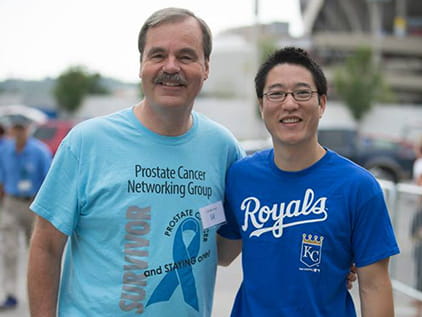Prostate Cancer Symptoms and Risks
To explore prostate cancer symptoms and risks, it’s important to first understand features of the prostate and changes that may cause concern. At The University of Kansas Cancer Center, we will work to understand your symptoms and risks and how they may relate to your prostate health.
The prostate is a gland that sits just below the bladder, and the urinary tract runs through the middle of it. It is a reproductive organ that makes part of the fluid for semen. The prostate is about the size of a walnut in young men and usually grows larger with age, which can cause age-related urinary symptoms even for men who never develop prostate cancer.
Prostate cancer occurs when cells in the prostate become abnormal. While some prostate cancers are caused by genetic mutations, the cause of most prostate cancers is unknown. As prostate cancer cells multiply, they can form a tumor in the prostate.
Like most cancers, there is a wide spectrum of aggressiveness for prostate cancer. Most prostate cancers grow slowly and don’t spread past the prostate gland. This type of prostate cancer may require only minimal treatment, or no treatment at all. Other types of prostate cancer can be more aggressive and grow quickly. Like other kinds of cancer, aggressive prostate cancer can spread beyond the prostate to other organs of the body (metastasize).
As with many cancers, doctors have a better chance of successfully treating prostate cancer when we can diagnose it early. This can be a challenge, as early-stage prostate cancer often has few symptoms. To diagnose prostate cancer, doctors recommend regular screening.
Prostate cancer symptoms
Prostate cancer does not typically cause symptoms in most men. When symptoms from prostate cancer occur, they can include:
- Deep pain in your lower back, belly, hip or pelvis
- Bladder not emptying completely when you urinate
- Pain or burning when you urinate
- Weaker than normal urine stream
- Blood in your urine
- Difficulty urinating
- Frequent urination
- Inability to urinate
- Waking in the night to urinate
Most of these symptoms are common in other conditions, like degenerative disk disease (back pain) and enlargement of the prostate (urinary symptoms). If you have these symptoms, you should seek an evaluation with your physician to determine if you need prostate cancer screening or if there is another cause for your symptoms.
Prostate cancer risk factors
While we don’t know the exact cause of prostate cancer, we do know men with certain risk factors may be more likely to develop it:
- Being African American
- Being over age 50
- Having a family history of prostate cancer
We recommend prostate cancer screening for all men who are:
- Over 40 and African American
- Family history of prostate cancer (father, brother(s), multiple nonfirst-degree male relatives)
- Family history of breast, colorectal, ovarian or pancreatic cancers
- Known genetic mutations such BRCA1 or BRCA2, Lynch syndrome
- Beginning at age 45 in all men
- Men over 70 in good health
Prostate cancer risk monitoring
While prostate cancer is not considered preventable, we conduct clinical research trials that may one day lead to ways to prevent prostate cancer. Our patients have access to these research trials, and we encourage you to speak to your physician to see if a clinical trial is right for you.
Prostate cancer is the 2nd leading cause of cancer death in men in the United States, but heart disease still kills many more men in this country. To combat both, we advise a heart-healthy lifestyle that includes regular aerobic exercise and a balanced diet low in salt, fats and red/processed meats.
You may improve your prostate cancer risk profile and overall health by following a nutritious diet and eating foods that are low-fat, high-fiber and contain omega-3 fatty acids, such as:
- Salmon, albacore tuna and sardines
- Soy products, such as tofu and soybeans
- Tomatoes and foods that contain tomato sauce
- Broccoli, cauliflower and cabbage
- Walnuts, flaxseed and their oils

Facing down prostate cancer
Start your path today.
Your journey to health starts here. Call 913-588-1227 or request an appointment at The University of Kansas Cancer Center.